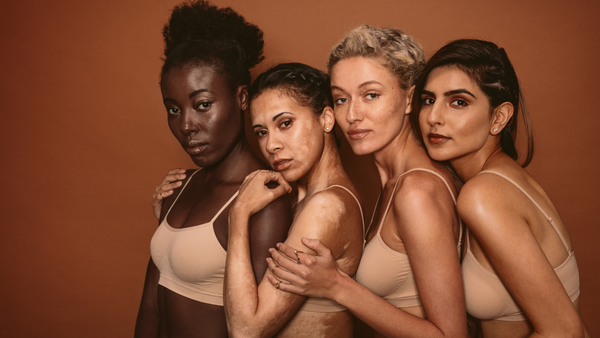Vital DHA - Premium Omega - Supplement for Men and Women: Preconception, Pregnancy and Postnatal
£20.50
Article
Posted on
It is often associated with menopause. However, it is estimated that about 17% of women experience vaginal dryness before or during sex, between the ages 18-50.
It can be an embarrassing topic to talk about, regardless of your age. So what is vaginal dryness, what causes it, and what can we do about it?
The symptoms of vagina dryness:
According to the NHS, the most common symptoms of vaginal dryness are:
These things may make you feel less like you want to have sex.
What causes vaginal dryness?
Glands at the neck of the cervix produce natural acidic moisture which has multiple uses.
Firstly, it keeps the vagina supple. As this moisture travels through the vagina, it removes dead cells, keeping it healthy and preventing infections.
When we are aroused, glands at the entrance of the vagina (Bartholin’s glands) produce extra moisture to aid intercourse.
There are a number of causes of vaginal dryness. Natural vaginal lubrication is largely driven by the hormone oestrogen which plays a vital role in reproductive health. When oestrogen levels are low, this can cause dryness and thinning of the vaginal tissue. This is a common symptom of menopause.
However, if you are not experiencing menopause, dryness could be the result of using perfumed soaps or products around the vagina.
Some medications can cause changes in your hormone levels, which impact how much vaginal fluid you have. These can include the contraceptive pill, antidepressants and some cancer treatments. Those who are breastfeeding also experience fluctuations in their hormone levels which can impact their vaginal fluid.
If you are not sexually aroused, you may also experience dryness.
What can be done about it?
If you experience vaginal dryness, there are a number of solutions.
Lubricants & Suppositories
Vaginal moisturiser
Specifically formulated creams can help support the natural moisture in the vagina. Wild Yam cream is often recommended.
Water based lubricants
These can be used directly on the vagina to make sex more comfortable. If sex is uncomfortable without a vaginal lubricant it’s important to make sure that you are using a safe one that is not going to affect the sperm’s ability to swim through the cervix to reach the egg – there are many sperm friendly lubricants on the market.
Suppositories and hormone treatments
For those experiencing menopause, there are a number of creams and tablets available to help treat dryness. We would recommend consulting with your GP or healthcare practitioner to find the right one for you.
Vitamins & Supplements:
Omega-3
Essential fatty acids such as omega-3 are vital for maintenance of vaginal mucus. Whilst you can obtain omega-3 through your diet by incorporating fish (think SMASH: Salmon, Mackerel, Anchovies, Sardines & Herring), if you’re not including fish in your diet, you can take an omega-3 supplement.
Vitamin A
Vitamin A is essential for the development of mucous membranes, which include the vagina.
Vitamin A can be found in leafy greens, peppers and tomatoes, and can also be taken as a supplement.
Vitamin B
Vitamin B supports our immune system. A well functioning immune system is vital for a healthy reproductive system. Vitamin B can be found in meats, leafy greens, seeds and fortified foods. If you’re thinking of a supplement, opt for a vitamin B complex that includes all types of vitamin B.
Probiotics
Low oestrogen levels can impact the bacteria living in our vaginal microbiome and cause imbalance (dysbiosis). Probiotics can help restore the balance in the vagina keeping it healthy. Probiotic food sources are live yogurt, kombucha, sauerkraut and miso, but can also be taken via supplements.
Lifestyle
Reduce stress
Stress is one of the key factors in improving hormone health. Whilst it is inevitable from time to time, chronic stress impacts everything from our immune health to our reproductive health.
Take time to unwind and relax. Activities such as massage, meditation and yoga can help reduce stress. Even a nice warm bath with aromatherapy oils can help.
Avoid perfumed soaps
Washing and using unfragranced soaps can help reduce irritation on this delicate ecosystem
Include foreplay
A key reason for vaginal dryness and discomfort during sex is the lack of arousal. Make time for foreplay to get you in the mood!
Diet
Dietary changes can impact our hormones. Be sure to follow a balanced diet. We have put together a blog post with our top tips for eating for your cycle. Read more here.
Recommended product:
£20.50
£25.00


